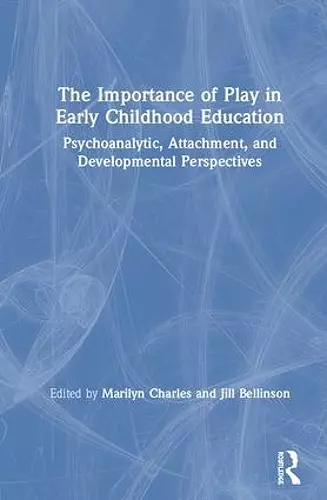The Importance of Play in Early Childhood Education
Psychoanalytic, Attachment, and Developmental Perspectives
Marilyn Charles editor Jill Bellinson editor
Format:Hardback
Publisher:Taylor & Francis Ltd
Published:11th Jun '19
Currently unavailable, and unfortunately no date known when it will be back
This hardback is available in another edition too:
- Paperback£37.99(9781138749931)

The Importance of Play in Early Childhood Education presents various theories of play and demonstrates how it serves communicative, developmental, and relational functions, highlighting the importance and development of the capacity to play in terms useful to early childhood educators. The book explicitly links trauma, development, and interventions in the early childhood classroom specifically for teachers of young children, offering accessible information that can help teachers better understand the meanings of children’s expressive acts.
Contributors from education, psychoanalysis, and developmental psychology explore techniques of play, how cultural influences affect how children play, the effect of trauma on play, factors that interfere with the ability to play, and how to apply these ideas in the classroom. They also discuss the relevance of ideas about playfulness for teachers and other professionals.
The Imprtance of Play in Early Childhood Education will be of great interest to teachers, psychoanalysts, and psychotherapists as well as play therapists and developmental psychologists.
‘The role of play therapy and a psychoanalytic understanding of how early childhood trauma influences the way a child learns to learn is at the forefront of this major contribution to the field of early childhood education. The Importance of Play in Early Childhood Education is written for the frontline educator: the classroom teacher.’-Annie Lee Jones Ph.D., Adjunct Professor and Co-Chair, Committee on Ethnicity, Race, Class, Culture and Language (CERCCL), New York University Postdoctoral Program in Psychotherapy and Psychoanalysis
‘Trauma in early childhood, including complex trauma and its transgenerational transmission, disrupts and precludes secure-base attachments and healthy development. To the extent that young children are "resilient," it is due to supportive and understanding relationships with parents, teachers, and early care-givers. This compilation of insightful chapters contributed by psychoanalysts and early childhood experts is a "must-read" for all who work with young children, promoting attunement, an understanding of the meaning of behavior and play, and preventing "burn out."’-Thomas F. Barrett, Ph.D., Psychologist, Child Psychoanalyst, Consultant and Professor of IECMH
‘Early stress, adversity, and trauma impacts an unthinkable number of young children in the United States. We know that children exposed to uncontrollable stress may suffer effects that may last well into adulthood and impact not only learning, but life-long health. Educating all adults who touch children’s lives in how to buffer the effects of stress and trauma equips those adults with the tools they need to make a significant impact in a child’s life. This volume provides those invaluable tools and insights.’- Linda C. Mayes, M.D., Arnold Gesell Professor and Director, Yale Child Study Center
‘The role of play therapy and a psychoanalytic understanding of how early childhood trauma influences the way a child learns to learn is at the forefront of this major contribution to the field of early childhood education. The Importance of Play in Early Childhood Education is written for the frontline educator: the classroom teacher.’
Annie Lee Jones PhD, adjunct professor and co-chair, Committee on Ethnicity, Race, Class, Culture and Language (CERCCL), New York University Postdoctoral Program in Psychotherapy and Psychoanalysis
‘Trauma in early childhood, including complex trauma and its transgenerational transmission, disrupts and precludes secure-base attachments and healthy development. To the extent that young children are "resilient," it is due to supportive and understanding relationships with parents, teachers, and early care-givers. This compilation of insightful chapters contributed by psychoanalysts and early childhood experts is a "must-read" for all who work with young children, promoting attunement, an understanding of the meaning of behavior and play, and preventing "burn out."’
Thomas F. Barrett, PhD, psychologist, child psychoanalyst, consultant and professor of IECMH
‘Early stress, adversity, and trauma impacts an unthinkable number of young children in the United States. We know that children exposed to uncontrollable stress may suffer effects that may last well into adulthood and impact not only learning, but life-long health. Educating all adults who touch children’s lives in how to buffer the effects of stress and trauma equips those adults with the tools they need to make a significant impact in a child’s life. This volume provides those invaluable tools and insights.’
Linda C. Mayes, MD, Arnold Gesell professor and director, Yale Child Study Center
'In their own unique approach, each article compels teachers to notice and engage with the active and dynamic communications of a child's play. Particularly compelling is the specific focus on early childhood education, since the preschool setting is often the first environment to interact with nonfamily members in such an intimate and intense way. The unifying emphasis of these discrete chapters is to encourage teachers to home in on the child's behaviour, listen to the meaning of their communication, and intervene in a way that furthers the play.'
Reyna Cowan, PsyD, LCSW. To read this review in full, please see the following: Cowan, R. (2023) The importance of play in early childhood education: Psychoanalytic, attachment and development perspectives, edited by Marilyn Charles and Jill Bellinson. New York: Routledge, 2019, 252pp.. International Journal of Psychoanalysis 104:1132-1135
ISBN: 9781138749924
Dimensions: unknown
Weight: 660g
252 pages